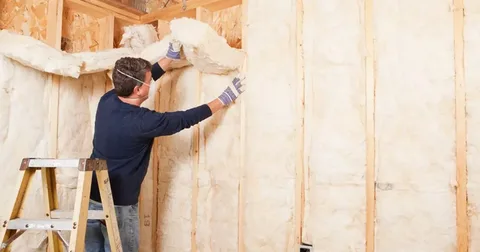Investing in commercial insulation is a strategic decision that can significantly impact your business’s operational efficiency, cost savings, and overall comfort. For businesses in Buffalo, NY, and the surrounding areas, high-quality insulation can enhance building performance and provide numerous benefits. In this blog post, we’ll explore why commercial insulation is a worthwhile investment for your business and how it can contribute to long-term success.
What is Commercial Insulation?
Commercial insulation refers to the materials used to improve the thermal performance of commercial buildings. It helps to manage the temperature inside the building, reducing energy consumption and increasing comfort. Insulation can be applied in various parts of a commercial building, including walls, roofs, ceilings, and floors.
Key Benefits of Investing in Commercial Insulation
1. Energy Efficiency and Cost Savings
One of the primary reasons to invest in commercial insulation is to improve energy efficiency. Insulation acts as a barrier to heat transfer, helping to keep indoor temperatures stable. This means that your heating and cooling systems don’t have to work as hard to maintain a comfortable temperature, which can lead to significant reductions in energy consumption and lower utility bills. Over time, these savings can offset the initial investment in insulation.
2. Enhanced Comfort for Employees and Customers
A well-insulated commercial building provides a more comfortable environment for both employees and customers. By maintaining a consistent indoor temperature, insulation helps to prevent drafts and hot spots. This creates a more pleasant atmosphere, which can improve employee productivity and customer satisfaction. For businesses that rely on customer foot traffic, such as retail stores or restaurants, a comfortable environment can enhance the overall customer experience.
3. Improved Indoor Air Quality
Commercial insulation contributes to better indoor air quality by minimizing the infiltration of outdoor pollutants and allergens. Insulation materials that provide an airtight seal prevent dust, pollen, and other contaminants from entering the building. This is especially important for businesses in urban areas or locations with high levels of outdoor pollution. Improved indoor air quality can lead to a healthier work environment and reduce the risk of respiratory issues among employees.
4. Noise Reduction
Insulation helps to reduce noise transmission between rooms and from outside sources. This is particularly beneficial for businesses that operate in noisy environments or have areas where confidentiality is important. For example, offices, medical facilities, and educational institutions can benefit from insulation that minimizes noise disruptions, creating a quieter and more focused work environment.
5. Building Longevity and Durability
Proper insulation can also extend the life of your commercial building. By preventing moisture from penetrating walls and roofs, insulation helps to protect against issues like mold and mildew growth, which can cause structural damage. Additionally, insulation can help to reduce wear and tear on HVAC systems, leading to fewer maintenance issues and longer-lasting equipment.
6. Compliance with Building Codes and Regulations
Many local building codes and regulations require a certain level of insulation to meet energy efficiency standards. Investing in commercial insulation ensures that your building complies with these codes, avoiding potential fines and penalties. It also demonstrates your commitment to sustainability and responsible building practices.
7. Environmental Benefits
Commercial insulation can contribute to environmental sustainability by reducing energy consumption and lowering greenhouse gas emissions. By improving energy efficiency, insulation helps to decrease the amount of energy needed to heat and cool your building, which can reduce your overall carbon footprint. For businesses looking to enhance their green credentials, insulation is an effective way to achieve environmental goals.
Types of Commercial Insulation
1. Spray Foam Insulation
Spray foam insulation is a versatile option that expands upon application to fill gaps and cracks. It provides excellent thermal resistance and air sealing capabilities, making it ideal for a variety of commercial applications. Both open-cell and closed-cell spray foam options are available, each offering different benefits depending on the specific needs of your building.
2. Fiberglass Insulation
Fiberglass insulation is a popular choice for commercial buildings due to its affordability and effectiveness. It is available in batts, rolls, and loose-fill forms and provides good thermal resistance. Fiberglass insulation is also non-combustible and does not absorb moisture, making it a durable option for many commercial applications.
3. Rigid Foam Insulation
Rigid foam insulation comes in boards or panels and is known for its high insulating value and moisture resistance. It is often used in areas where high thermal performance is required, such as exterior walls, roofs, and foundations. Rigid foam insulation offers excellent durability and is resistant to both moisture and pests.
4. Cellulose Insulation
Cellulose insulation is made from recycled paper products and treated with fire retardants. It is commonly used in attics and wall cavities and provides good thermal performance and air sealing. Cellulose is an eco-friendly option that contributes to sustainability efforts.
Choosing the Right Insulation for Your Commercial Property
Selecting the appropriate insulation for your commercial building involves considering several factors, including:
- Building Type: Different types of insulation are suited to different building types. For instance, spray foam is ideal for sealing gaps in irregularly shaped spaces, while fiberglass is commonly used in standard wall cavities.
- Climate: The local climate in Buffalo, NY, can influence the type of insulation you choose. Insulation with a high R-value is essential for managing temperature fluctuations in regions with extreme weather.
- Budget: Consider the initial cost of insulation materials and installation, as well as the long-term savings on energy bills. Higher-quality insulation may have a higher upfront cost but can provide greater energy savings over time.
- Installation: Professional installation ensures that insulation is applied correctly and performs effectively. Working with experienced contractors helps to maximize the benefits of your insulation investment.
FAQs About Commercial Insulation
1. What are the benefits of commercial insulation?
Commercial insulation enhances energy efficiency, improves indoor comfort, reduces noise, and contributes to better indoor air quality. It also helps protect against moisture damage and can extend the lifespan of your building and HVAC systems.
2. How does commercial insulation reduce energy costs?
By creating a barrier against heat transfer, commercial insulation helps to maintain a stable indoor temperature. This reduces the workload on heating and cooling systems, leading to lower energy consumption and reduced utility bills.
3. Is commercial insulation a requirement for new buildings?
Many building codes and regulations require a minimum level of insulation in new construction to meet energy efficiency standards. Investing in high-quality insulation ensures compliance with these regulations and contributes to a sustainable building practice.
4. How long does commercial insulation last?
The lifespan of commercial insulation varies depending on the type of material used and the conditions in which it is installed. Generally, well-maintained insulation can last for several decades. Regular inspections and maintenance help ensure continued effectiveness.
5. Can insulation help with noise reduction in commercial buildings?
Yes, insulation can significantly reduce noise transmission between rooms and from external sources. This is especially beneficial in environments where sound control is important, such as offices, medical facilities, and educational institutions.
Conclusion
Investing in commercial insulation offers numerous benefits for businesses in Buffalo, NY, and the surrounding areas. From improving energy efficiency and reducing costs to enhancing comfort and indoor air quality, insulation plays a critical role in the performance and sustainability of commercial properties. For expert advice and professional installation of commercial insulation, contact Ideal Spray Foam NY at (716) 274-6260. Serving Buffalo, Niagara Falls, Lockport, Amherst, West Seneca, Hamburg, and Newfane, New York, Ideal Spray Foam NY is dedicated to providing top-quality insulation solutions for your business needs.
Alarm clock, digital clock, table clock for Students, watch timer for study, Home, Office, Bedroom, kitchen, loud desk alarm clocks for heavy sleepers with Automatic Sensor, Time, Date & Temperature
₹297.00 (as of 19 September, 2024 18:09 GMT +05:30 - More infoProduct prices and availability are accurate as of the date/time indicated and are subject to change. Any price and availability information displayed on [relevant Amazon Site(s), as applicable] at the time of purchase will apply to the purchase of this product.)Homestrap Set of 6 Non-Woven Printed Saree Cover/Cloth Storage/Wardrobe Organizer For Clothes with Transparent Window (Grey)(Shark Tank Featured)
₹369.00 (as of 19 September, 2024 18:22 GMT +05:30 - More infoProduct prices and availability are accurate as of the date/time indicated and are subject to change. Any price and availability information displayed on [relevant Amazon Site(s), as applicable] at the time of purchase will apply to the purchase of this product.)ATOM Digital Kitchen Food Weighing Scale For Healthy Living, Home Baking, Cooking, Fitness & Balanced Diet. | 1 Year Warranty | 10Kg x 1gms with 2 Batteries Included, SF400/A121, Color May vary
₹235.00 (as of 19 September, 2024 18:22 GMT +05:30 - More infoProduct prices and availability are accurate as of the date/time indicated and are subject to change. Any price and availability information displayed on [relevant Amazon Site(s), as applicable] at the time of purchase will apply to the purchase of this product.)Pigeon by Stovekraft Amaze Plus Electric Kettle (14289) with Stainless Steel Body, 1.5 litre, used for boiling Water, making tea and coffee, instant noodles, soup etc. (Silver)
₹549.00 (as of 19 September, 2024 18:22 GMT +05:30 - More infoProduct prices and availability are accurate as of the date/time indicated and are subject to change. Any price and availability information displayed on [relevant Amazon Site(s), as applicable] at the time of purchase will apply to the purchase of this product.)Rylan Black Gas Saver Burner Stand Gas Chula Burner Gas Saver Stand Jali Ring Fire & Windproof Energy Saving, Gas Chula Support Stand 4 Legs Supported For Indian Gas 0.7Mm (Pack Of 1) Black - Metal
₹279.00 (as of 19 September, 2024 18:09 GMT +05:30 - More infoProduct prices and availability are accurate as of the date/time indicated and are subject to change. Any price and availability information displayed on [relevant Amazon Site(s), as applicable] at the time of purchase will apply to the purchase of this product.)Discover more from The General Post
Subscribe to get the latest posts sent to your email.





